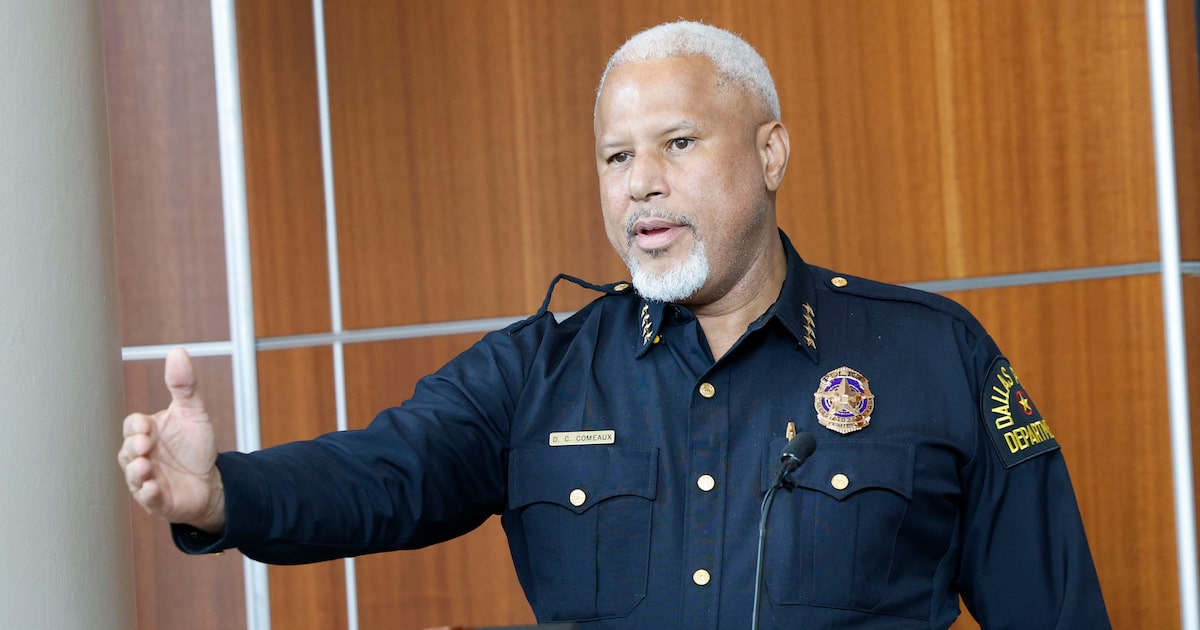Dallas Police Chief Daniel Comeaux said Wednesday he wants the police department focused on responding to local calls amid a push by the mayor to consider joining in on federal immigration enforcement.
When asked about his response to Mayor Eric Johnson’s recent memo saying the police chief shouldn’t have unilaterally rejected a $25 million offer from U.S. Immigration and Customs Enforcement that would have allowed local officers to enforce federal immigration laws, Comeaux told The Dallas Morning News that he wanted the department to “stay focused on being able to answer all the 911 calls and keep everybody safe in Dallas.”
“That’s what’s important to me right now, as chief of police and the Dallas police department, is that we take care of everyone in Dallas,” Comeaux told The News after Downtown Dallas Inc.’s annual State of Downtown event, where he was the keynote speaker. “So we’re going to be laser focused on just making sure that we’re able to respond in a timely manner and take care of everyone here.”
Comeaux’s appearance follows his announcement earlier this month that he rejected the $25 million ICE offer for the 287(g) program, which would allow local law enforcement to perform certain immigration officer functions. In an Oct. 17 memo, Mayor Johnson urged the City Council’s public safety and government efficiency committees to review the program’s potential benefits, arguing it could act as a “force multiplier” for crime reduction and provide full reimbursement for officer salaries, benefits and overtime.
Political Points
The mayor’s memo prompted 10 council members — Chad West, Mayor Pro Tem Jesse Moreno, Jaime Resendez, Laura Cadena, Adam Bazaldua, Lorie Blair, Paula Blackmon, Kathy Stewart, Deputy Mayor Pro Tem Gay Donnell Willis and Paul Ridley — to issue public statements arguing that immigration enforcement should remain a federal responsibility. They warned that local participation risks eroding trust between the police department and Dallas’ immigrant communities. Hispanic residents make up about 42% of the city’s 1.3 million inhabitants. Concerns are especially heightened because federal enforcement policies under the Trump administration have largely targeted communities south of the U.S. border.
Comeaux’s comments to The News largely echoed what he said during the State of Downtown event: he wanted the department to continue growing engagement with the community, noting that he was focused on not pulling neighborhood police officers for other department initiatives.
“I want us to be joined together as one,” Comeaux said while being interviewed by Downtown Dallas Inc. President and CEO Jennifer Scripps, “and I feel it’s so important for the (neighborhood police officer) officers and just every officer, to be able to walk in and have open conversations.”
Also during the event, the police chief touted the recent increase in officers’ presence downtown, from 90 to roughly 120 cops dedicated to Dallas’ central core. He noted increases in traffic tickets and a more aggressive approach to crimes impacting downtown local businesses, like shoplifting.
Citywide, he mentioned increases in recruiting class numbers, decreases in year-to-date numbers on murders and vehicle-caused deaths and that the department is considering using drones to respond to the department’s lowest priority calls to free up officers to more quickly respond to more serious crimes.
“I think once we get these drones up, we can start clearing a lot of these (priority) three and four calls, where we might not have to send an officer physically to the location,” Comeaux said, “which would take out 15 minutes of drive time to get there, look around, talk, see, leave and then 15 minutes to drive to the next call.”
This story will be updated.

